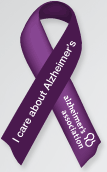Non-verbal security blankets: Related to verbal security blankets are objects that enhance confidence. There are many athletes who have a “lucky” shirt or cap. Many people carry something in their purse or pocket for good luck or that is symbolically important in some way. People with Alzheimer’s disease often have these, too.
- Men may like to carry a newspaper or jingle coins in their pockets.
- I interviewed one tall man in Arizona who could converse easily when he was standing outdoors, wearing his cowboy hat and looking down at those around him. When he sat down indoors without his hat, his conversational abilities diminished markedly.
- Women may carry a purse or a spoon, a decorative pillow or some other household item that helps them feel grounded to a particular place.
- You may even find that giving a person with Alzheimer’s disease something to hold while you are talking with him increases his comfort in talking with you. It helps him feel relaxed and more self-assured. Sometimes that something is as simple as giving him your hand to hold – or holding his.
- Some women carry dolls or stuffed animals and sometimes they believe they are real. At other times, they are probably security blankets. When your world is constantly confusing, it helps to have something sweet to hang onto.
Word finding difficulties increase in this middle stage. Not only do people have more trouble conversing normally, but being asked to come up with a specific word (What do you call this? as you point to a watch) may be at least momentarily impossible for them. As a result, they may make-up words, called “neologisms” or “word salad.” “Thingamajig” is a widely accepted neologism that can mean almost anything, but a person with Alzheimer’s disease may use a descriptive phrase that makes some sense, as in saying “nail-banger” for “hammer.”
Other people for whom English was not their first language will begin to revert to their native language. One of the theories about the skills that are lost when we have Alzheimer’s disease is “first in, last out.” That means that the things we learned as infants and toddlers – walking, feeding ourselves, toilet training – are skills we are likely to retain until Alzheimer’s disease is quite advanced, as long as we have good care. If English is a person’s second language, it is not surprising that he would go back to the language of his birth. It’s important then for caregivers to try to learn the meaning of key phrases in that person’s language. One more word of caution, however: If a person has begun using made-up words in English, he is also likely to be using made-up words in his native language, so even a translator may not understand everything he says!
Next up: Late stage changes in AD








No comments:
Post a Comment